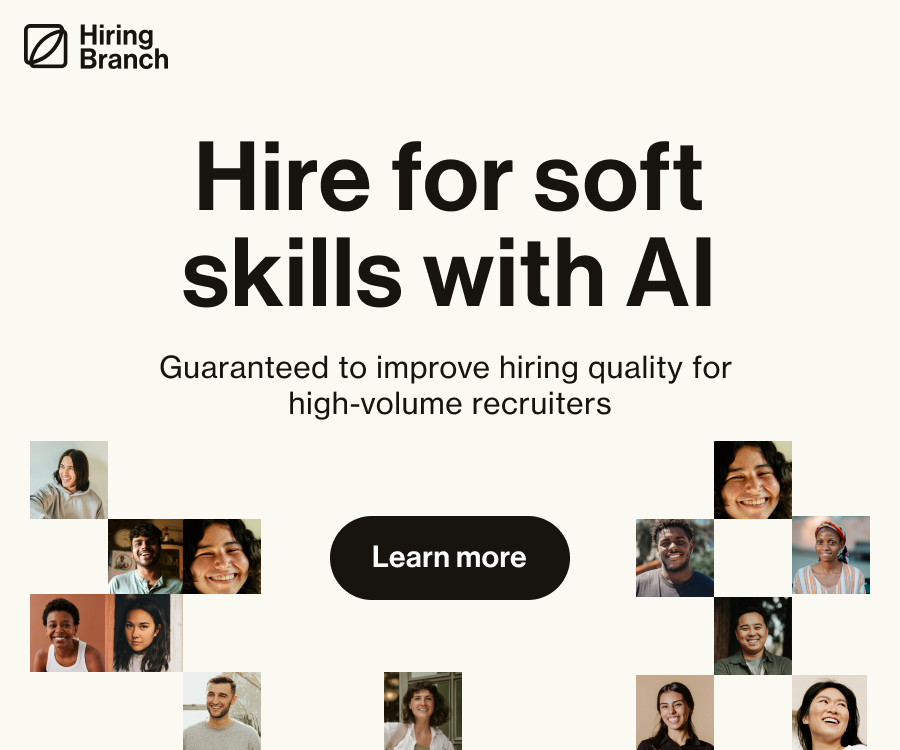Using Soft Skills To Solve The Biggest High-Volume Hiring Challenges
Less attrition with highly-skilled candidates and employees!
Posted on 12-11-2024, Read Time: 6 Min
Share:

Highlights:
- Skills-based hiring is a trend challenging the status quo around traditional high-volume hiring processes.
- Psychometric tests can be inaccurate and put certain individuals at a disadvantage, and personality tests are only recommended for professional development.
- 63% of high-volume hiring respondents reported that time-to-hire is the most important metric for making decisions.

Using fresh data from HR.com’s ‘State of High-Volume Hiring 2024’ report, this article will look at one of the most underutilized solutions to high-volume hiring challenges - leveraging soft skills!
What’s Stumping High-volume Recruiters?
Earlier this year, HR.com surveyed nearly 200 HR professionals from around the globe to report high-quality data and trends back to the industry. The trends that emerged from the survey ranged from reporting metrics to top challenges and perceived solutions.Sixty three percent of high-volume hiring respondents reported that time-to-hire is the most important metric for making decisions. This is followed by retention rate (59%) and quality of hire (57%).
In other words, high-volume recruiters aim to find high-quality candidates quickly who will stay on the job. Similarly, 60% of high-volume hiring teams reported that low-quality candidates are a top challenge.
Current Assessments Don’t Correlate to Performance
Today, high-volume hiring teams have to sift through candidate applications at scale, and many use technology to make this process more efficient. For example, according to HR.com’s report, assessments or pre-hire assessments are used by at least half of the respondents - either in-house or through a recruitment partner. The other half of the group stated that they didn’t need a pre-hire assessment, which leaves the question of what they are using. Often the answer is manually interviewing after some form of basic screening.Of those using assessment technology, the system seldom has anything to do with measuring soft skills - even though soft skills account for 85% of career success. Instead, systems typically include personality or psychometric testing, or some form of questionnaire, which doesn’t correlate with hiring performance results.
Psychometric tests can be inaccurate and put certain individuals at a disadvantage, and personality tests are only recommended for professional development. Unlike these tests, soft skill assessments have been proven to reduce bad hire rates to as low as .05%, addressing the concern for candidate quality.
While soft skill assessments can be linked to performance outcomes, very few high-volume hiring teams leverage this important technology. Rather the reliance on manual processes and ineffective technology prevails. The current state of high-volume hiring practices is leading to the top challenges listed above and there has to be a better way.
Addressing High-volume Challenges with Skills-based Hiring
Evidence says skills-based hiring can address and even improve the most important metrics in high-volume hiring, like candidate quality. What about other important high-volume recruiting metrics?Lauren Lightbody, a Senior Director at Propeller, says “Skills should inform how candidates are sourced and matched to open roles and how they are interviewed and assessed. …Having the right technology is critical and enables this process at scale. AI tools can help…” She adds that when it comes to skills-based hiring “…most HR professionals …may not know how to assess whether it is a good fit for their organization or how they can get started.”
Soft skills assessments can streamline hiring processes by quickly matching the best candidates for the role based on their skills and the skills needed for that particular role.
When suitable candidates can be easily and accurately selected for a job based on skills, time-to-hire can be reduced to as little as two days. That’s revolutionary for teams that get dozens of applications every month, imagine for those who get thousands.
There are downstream skills-based hiring benefits for high-volume recruiters. Even metrics like attrition can be significantly reduced with a skills-first approach. HiringBranch found that highly-skilled candidates and employees attrit less, which means if organizations can identify skilled applicants in the hiring process, they can curb attrition rates and improve retention. Steven Rothberg, founder and chief visionary officer of College Recruiter talked on the WRKdefined podcast recently stating how skills-based hiring is an opportunity for employers to benefit from a larger and more diverse applicant pool.
Hiring for the right skills can help high-volume recruiters improve candidate quality, improve time-to-hire, slow employee attrition, and more, but the data suggests recruiters aren't making this link. Despite the challenges listed, just 30% of the HR.com survey respondents intend to implement technologies for assessing skills to enhance high-volume hiring processes within the next year.
Measuring Skills with AI Is an Opportunity
Evaluating candidates for their skills, rather than a CV or any other form of screening, is extremely effective, and there’s good reason for that. When candidates can respond to job-relevant situations in an assessment they reveal various soft skills they possess, like the ability to listen actively or to express empathy.
Soft skills assessments give the recruiter so many more relevant data points to make a decision with - data points that are not present in other types of evaluation, even interviews. High-volume recruiters need to be able to make sense of this data at scale and that’s why AI technologies become essential in the equation.
With skills-based, AI assessments powering high-volume hiring, employers have an immense opportunity to do better - and that is key - measurable improvements to the high-volume hiring process.
Soft skills assessments give the recruiter so many more relevant data points to make a decision with - data points that are not present in other types of evaluation, even interviews. High-volume recruiters need to be able to make sense of this data at scale and that’s why AI technologies become essential in the equation.
With skills-based, AI assessments powering high-volume hiring, employers have an immense opportunity to do better - and that is key - measurable improvements to the high-volume hiring process.
Author Bio
 |
Stephane Rivard is CEO & Co-Founder of HiringBranch. Stephane, a lifelong entrepreneur, is on a global mission to improve employee performance using skills-based hiring assessments and training. In his spare time, Stephane likes to play chess, run, ski, mountain bike, sail or participate in any outdoor adventure. He volunteers his time officiating National Alpine Ski Races with hope of one day doing so at the World Cup level. His greatest soft skills include problem solving, building rapport, curiosity and divergent thinking. |
Error: No such template "/CustomCode/topleader/category"!


